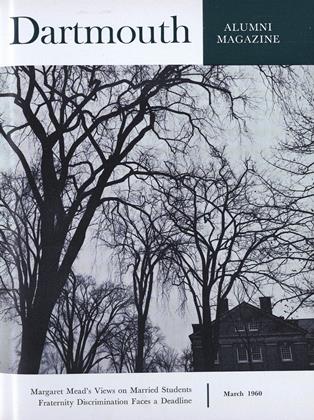Concerning Co-eds
To THE EDITOR:
"Dartmouth College, a male stronghold since it opened at Hanover, N.H., in 1769, is going to become co-educational - at least in the summertime.... The summer term will be open to students from other colleges - including women. These will be the first women undergraduates ever admitted to the college." (New York Herald-Tribune, January 7, 1960.)
Oops! Maybe the College needs someone steeped in Dartmouth lore as a historian, in the mold of Lord or Smith, or, more likely, the reporter sought to add a fillip to an otherwise prosaic array of facts - another speech by a college president.
A half-century ago, Dartmouth had a "summer term" attended by "coeds." I know, because I received a couple of credits at a summer session during July and August of 1910. How long the "summer term" had been in existence or how long it prevailed I have not researched. But the majority of its "student body" were females - New England school teachers, adding to their high-school education or seeking to upgrade their teaching certificates. They are better left uncharacterized - but they were something! Some of the male contingency was in the same category. And they were undergraduates - maybe under-undergraduates. All of the courses that were given were elementary ones. The rest of the students were football players - I distinctly remember "Reggie" Bankart - and others like myself, making up credits for "flunked" courses. I had an unfortunate experience with Xenophon's Anabysis my sophomore year.
I never spent a more glorious summer. Afternoons were spent in the outdoors of the incomparable Hanover summer. Frequently, Leland Griggs, who was then an instructor, invited me to accompany him up the Connecticut in his canoe to gather blue-green algae for next day's class, when we made supper on the river bank on purchases of cheese, crackers and other staples of neighboring general stores.
I am all for the addition to the curriculum of a summer quarter. However, if the female collection that attended Dartmouth's summer session of yore is an exemplar, I advise the boys not to become too excited about the inauguration of Dartmouth coeducation.
Harrison, N.Y.
EDITOR'S NOTE: Summer school was started as a personal venture by Professor Worthen and some other faculty members, and had no official connection with Dartmouth College. In 1912 the College assumed financial responsibility for the school, but summer school students were not considered Dartmouth undergraduates. Their names were never entered on the College records, though Dartmouth students did receive credit for their summer studies. Three women, all school teachers, received Dartmouth M.A. degrees for summer work, and their names appear on the permanent alumni records.
Ski Count Wrong
To THE EDITOR:
Roberts W. French has written a fine article about the DOC in your February number, giving a good account of its founding fifty years ago and of its wonderful growth since then. But how did he come to make such a slip as to say, "That man was Fred Harris '11, the owner of the only pair of skisin Hanover in 1909, though there had been others earlier."
There was actually a considerable number of students of that college generation who knew the joys of skiing. Earlier students and residents of Hanover had indulged in the sport for a decade or more before the first meet was held. As soon as the first snows came soon after Thanksgiving we got out our skis to coast down the slopes of the golf course or the Vale of Tempe, or to take long cross-country trips over the hills and valleys beyond Hanover. Our skis were indeed crude, long and wide, with no harness, only a toe strap, apt to be wobbly, and sometimes a strap high over the heel; our single pole was cut from the woods to help us climb hills and to ride down on if we were too unsteady on our skis.
There were enough students who enjoyed skiing, or other winter sports, so that when Fred Harris issued the call for a winter meet in 1910 their enthusiasm made it a success and showed those who stayed inside that they could find more zest for life outdoors. Dartmouth can thank him for creating a new tradition for its everlasting advantage.
Newton, Mass.
More on Cattleboats
To THE EDITOR:
Do you want to print the enclosed snapshot of "We Were Seven" globe-girdling bovine nurses on the deck of a cattleboat to Merry England in the summer of 1909? Did this trip excite more Wah Hoo Wah lads to do likewise in following summers? Stanley B. Macomber '11 in his letter in the January issue identified at least one in the photograph submitted by Malcolm R. Lovell.
In this picture I can identify all but the third Dartmouth student from the left in each row. Left to right, they are: top row - Henry Van Dyne '12 (my roommate), John Fox '12, not known; front row —James Willard '11, Claire Duffie '11, not known, George Geiser '12.
West Orange, N.J.
 View Full Issue
View Full Issue
More From This Issue
-
 Feature
FeatureProfessor Jesup's Herbarium
March 1960 By JAMES P. POOLE -
 Feature
FeatureFraternity Discrimination Faces a Deadline
March 1960 By THOMAS E. GREEN '60 -
 Feature
FeatureAre Marriage and College Compatible?
March 1960 By MARGARET MEAD -
 Feature
FeatureLife with a Teen-Age Gang
March 1960 By ROBERT I. POSTEL '60 -
 Article
ArticleThe Mission of Liberal Learning
March 1960 By PRESIDENT JOHN SLOAN DICKEY -
 Class Notes
Class Notes1918
March 1960 By THOMAS E. SHIRLEY, W. CURTIS GLOVER, ROBERT FISH







